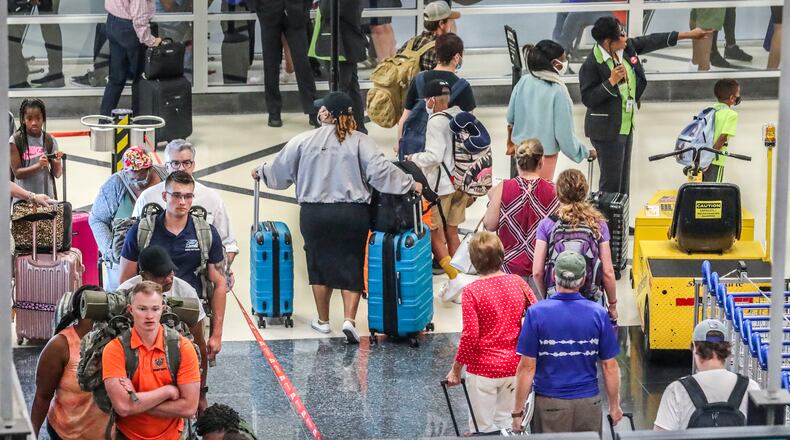Delta Air Lines had the most cancellations of any U.S. airline in May, according to the latest federal data.
Out of all flights on Delta and Delta Connection in May, 2.7% were canceled, which was the highest rate among U.S. airlines, according to the Wednesday’s Air Travel Consumer Report issued by the U.S. Department of Transportation.
That’s a sharp spike in cancellations compared to Delta’s usual performance with less than 0.7% of flights canceled, as was the case last year and in 2019 before the pandemic.
As temperatures have warmed, demand has also grown with pandemic-weary travelers wanting to return to the skies. But the demand surge has been hampered by operational challenges across the airline industry.
Delta and Delta Connection canceled 3,398 flights in May. The month included the busy and chaotic Memorial Day travel weekend when many vacationers set off for their first trips of the summer. Hundreds of thousands of people had their plans disrupted by flight cancellations.
The uncharacteristically poor performance in May and lingering problems this summer were so concerning that Delta CEO Ed Bastian said last week the airline will halt flight growth the rest of the year in an effort to keep the flight schedule manageable and reduce flight cancellations.
“I’d like to sincerely apologize to those who have been impacted by cancellations, delays, and long wait times over the last two months,” Bastian said last week, adding that “restoring operational excellence is our top priority.” He said Delta’s July performance has been significantly better so far, with far fewer cancellations.
“By ensuring capacity does not outstrip our resources and working through our training pipeline, we’ll continue to further improve our operational integrity,” Bastian said. Delta has hired 18,000 employees in the last year and a half, “you don’t step into these jobs and you learn it overnight. There’s a significant learning factor that we’re also going through,” he said.
There’s a lot at stake: If Delta doesn’t restore its reputation for running a quality operation, it risks losing the millions of customers it has managed to attract over the years because it was known for reliable flight schedules.
Competing airlines, in fact, canceled fewer flights than Delta in May.
Chicago-based United Airlines and its partners canceled 2,674 flights in the month, a 2.4% cancellation rate. Fort Worth, Texas-based American Airlines and its partners canceled 3,052 flights, a 2% cancellation rate.
Dallas-based Southwest Airlines, the second-largest carrier at Hartsfield-Jackson International Airport, canceled 809 flights in May, a 0.7% cancellation rate.
Delta and Delta Connection still managed to maintain relatively-good on-time performance in May, ranking second among U.S. airlines with 80.7% on-time arrivals, behind Hawaiian Airlines with 86% on-time arrivals. However, Delta and other airlines had multiple tarmac delays that lasted more than three hours, according to the federal data.
Nearly 24% of the complaints to the federal government about airlines in May concerned cancellations, delays and other flight schedule disruptions. Another 30.5% of complaints were about refunds. There were a total of 245 complaints about Delta in the month — fewer than American, United, Spirit and Frontier, but more than Southwest.
The DOT noted Wednesday that airlines are required to have a customer service plan on how it will mitigate inconveniences due to flight cancellations and misconnections, and the agency said it “monitors airlines’ actions and reviews complaints that it receives against airlines to ensure that consumers’ rights are not violated.”
About the Author
The Latest
Featured



